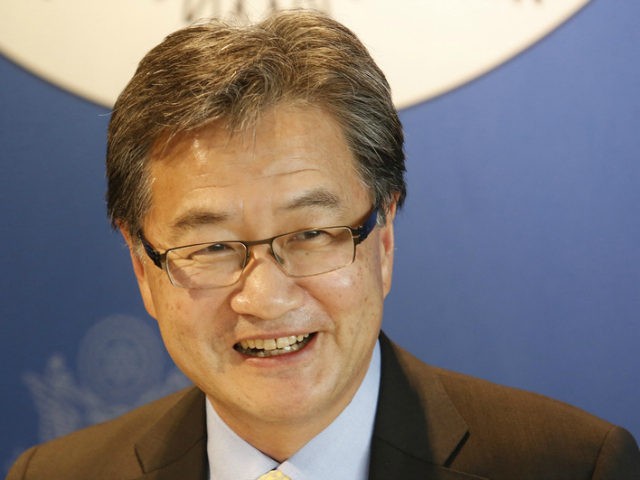A top U.S. diplomat to North Korea has unexpectedly announced his retirement days after President Donald Trump expressed a willingness to open talks with the rogue communist state.
Joseph Yun, 64, said that Secretary of State Rex Tillerson accepted his resignation “with regret” after 23 years of civil service.
“We are sorry to see him retire, but our diplomatic efforts regarding North Korea will continue based on our maximum pressure campaign to isolate the DPRK (Democratic People’s Republic of Korea) until it agrees to begin credible talks toward a denuclearized Korean peninsula,” State Department spokeswoman Heather Nauert said.
The Obama administration appointed Yun as the U.S. special representative for North Korean policy in October 2016, and he played an important role in the release of the imprisoned college student Otto Warmbier, who died shortly after his return home.
His retirement comes at a precarious time following a relatively successful Winter Olympics in South Korea in which both countries engaged in joint efforts, such as marching under one flag and fielding a joint ice hockey team.
Many were surprised by his sudden departure, given that Yun recently visited South Korea and Japan to discuss solutions to the North Korea crisis as the regime continues to develop its nuclear program and threaten war against America.
In Tokyo, Yun said the U.S. was still a distance away from using a military option against the Kim regime and, instead, would pursue diplomatic means of de-escalating the situation.
“Our policy is based on putting pressure as well as leaving the door open for a dialogue,” he said. “I think everyone wants to give diplomacy a good run.”
Last week, Treasury Secretary Steven Mnuchin announced the toughest sanctions ever put in place against North Korea, which involve the targeting of shipping and vessels that allow the regime to sustain itself economically.
President Donald Trump has since mulled the possibility of opening talks with the North Korean regime but “only under the right conditions.”
“I think this is a huge loss for the U.S. government at a critical moment,” Abraham Denmark, the director of the Asia Program at the Woodrow Wilson International Center for Scholars, told CNN.
“He was a great advocate for dialogue and for diplomacy, and I think it’s unfortunate that his voice will no longer be in the conversation inside the U.S. government,” he added.
You can follow Ben Kew on Facebook, on Twitter at @ben_kew, or email him at bkew@breitbart.com.

COMMENTS
Please let us know if you're having issues with commenting.